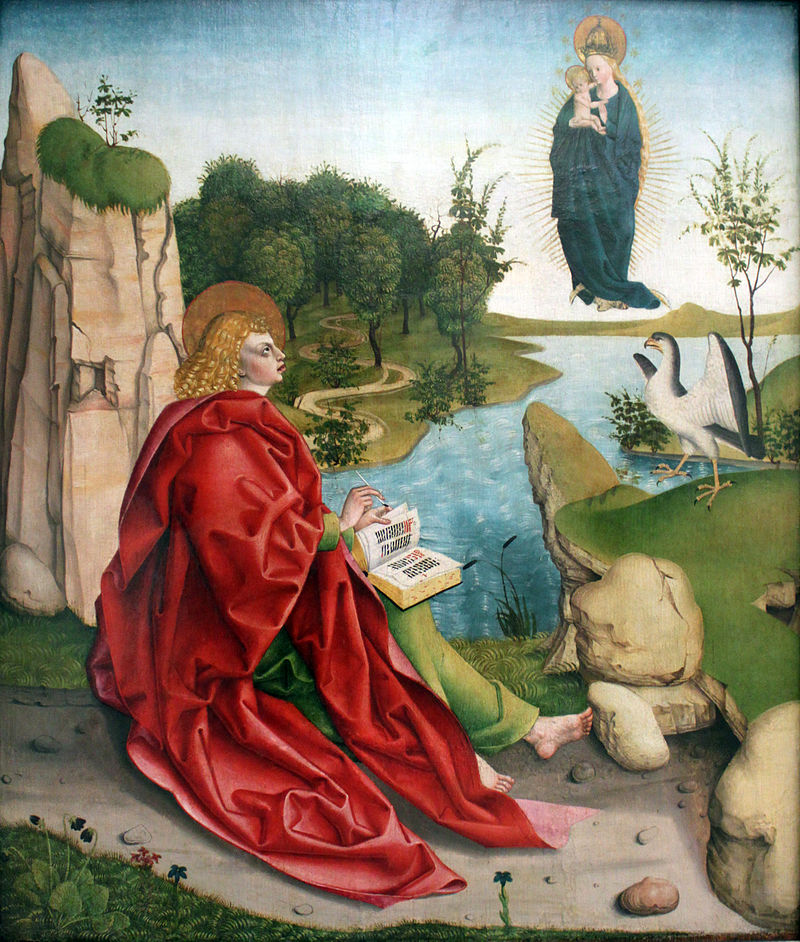 |
| Sigmund Gleismüller (1449-1511) |
In the pre-1960 calendar, today was the Octave Day of St John the Evangelist.
The three feasts of the Christmas Octave had only 'simple' octaves, which meant that they were only marked on the Octave Day itself. At Matins in the 1953 rubrics, the Octave Day used the invitatory and hymn of the feast, but the psalms of the day, and had only two Nocturns, with the third reading and responsory of the feast.
The 1962 reinvention of the three days then, simply substituted an extra Scriptural reading for the patristic reading of the feast, which was as follows:
Reading 3: Ex Tractatu sancti Augustíni Epíscopi in Joánnem - In quátuor Evangéliis, vel pótius quátuor libris uníus Evangélii, sanctus Joánnes Apóstolus non immérito secúndum intelligéntiam spiritálem áquilæ comparátus, áltius multóque sublímius áliis tribus eréxit prædicatiónem suam: et in ejus erectióne étiam corda nostra érigi vóluit. Nam céteri tres Evangelístæ tamquam cum hómine Dómino in terra ámbulant, et de divinitáte ejus pauca dixérunt: istum autem quasi pigúerit in terra ambuláre, sicut ipso exórdio sui sermónis intónuit, eréxit se non solum super terram, et super omnem ámbitum áëris et cæli, sed super omnem étiam exércitum Angelórum, omnémque constitutiónem invisibílium Potestátum: et pervénit ad eum, per quem facta sunt ómnia, dicéndo: In princípio erat Verbum, et Verbum erat apud Deum, et Deus erat Verbum. | A lesson is from a treatise of St. Augustine, Bishop of Hippo - Of the Four Evangelists, or, rather, the Four Writers of the one Evangel, the holy Apostle John has not unworthily been compared by spiritual writers to an eagle, because of the lofty and glorious flight of his teaching, soaring above the other three; a flight that raises not himself alone, but also the hearts of all, whosoever will hear him. The other three writers walk with the Lord upon earth, as with a man, and enlarge little upon His Godhead; but John, as though it had wearied him to walk upon earth, in the very first words of his writing, rises not above the earth only, or above the firmament, and the heavens, but above every angel, and above every power of things unseen, and flies directly to him by whom all things were made, saying In the beginning was the Word, and the Word was with God, and the Word was God. |
R. Valde / honorándus est beátus Ioánnes, † qui supra pectus Dómini in cena recúbuit: * Cui Christus in cruce Matrem vírginem vírgini commendávit. V. Virgo est eléctus a Dómino, atque inter céteros magis diléctus. R. Cui Christus in cruce Matrem vírginem vírgini commendávit. V. Gloria... R. Cui Christi... | R. Very worshipful is blessed John, which leaned on the Lord's Breast at supper. * To Him did Christ upon the Cross commit His mother, maiden to maiden. V. The Lord chose him for his clean maidenhood, and loved him more than all the rest. R. To him did Christ upon the Cross commit His mother, maiden to maiden. |
Sequence for the feast
The following sequence was written in St John's honour by a fourteenth century Swiss Dominican novice nun, Kathrin Brümsin.
The sister was struggling to learn Latin and the liturgy, and prayed to the saint, who taught her the twenty four verses in a
dream-vision. Here are a few of the opening verses, with the translation by Dom Laurence Shepherd from Gueranger's
The Liturgical year:
Verbum Dei, Deo natum,
Quod nec factum nec creatum
Venit de caelestibus,
Hoc vidit, hoc attrectavit,
Hoc de caelo reseravit
Iohannes hominibus.
The Word of God, who was born of God
and was not made nor created,
and who came down from heaven
was seen and handled and revealed to men
by John the Evangelist.
Inter illos primitivos
Veros veri fontis rivos
Iohannes exsiliit
Toti mundo propinare
Nectar illud salutare
Quod de throno prodiit.
John sprang up
amidst those true rivulets,
which from the commencement
flowed from the True Fountain;
he has made the whole world drink
of that life-giving nectar that flows
from the throne of God.
Caelum transit, veri rotam
Solis videt ibi totam
Mentis figens aciem;
Speculator spiritalis
Quasi Seraphim sub alis
Dei videt faciem.
He soared above the heavens,
And gazed
with the fixedness of his soul’s eye
on the brightness of the true Sun
this spiritual contemplator saw,
as it were from under the wings of the Seraphim,
the face of God.


